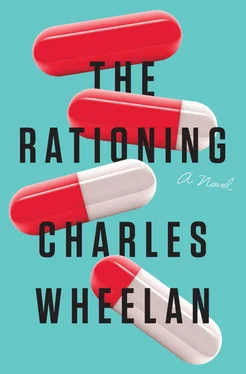By the time the two of them reached the White House, the Chief of Staff had already made her permanent mark on the President’s career, and also on the trajectory of American politics. She had helped him run successfully for the Senate from Virginia as a conservative Democrat. He won by huge margins in suburban areas, particularly with women and college-educated voters. The handsome senator was fiscally responsible but not scarily so. He believed in climate change (and the scientific method more generally) without ever asking voters to do anything uncomfortable about it. When he began thinking about the presidency, however, he had a problem. The Democratic Party was in complete disarray nationally, with a deepening split between the progressives, who were trying to pull the party sharply to the left, and the moderates, who believed the future of the party lay in winning the American political center.
The Democrats had developed a “Tea Party problem.” Just as the Republicans were finalizing their divorce, leaving the New Republicans free to run without pandering to the Tea Party, the Democrats were still trapped in a bad marriage. Progressive Mommy and centrist Daddy were fighting incessantly, and it was killing their White House prospects. Every national Democratic candidate would kowtow to the progressives, especially to raise money in New York and California. They would promise a $20 minimum wage, a carbon tax, and a whole bunch of other things that would then sink them in the flyover states. When Elizabeth Warren received the nomination in 2024, she went on to lose forty-nine states in the general election, even New York because she had so antagonized Wall Street. It is a special achievement for a Democrat to lose New York.
What was a smart, handsome, ambitious Democratic senator from Virginia to do? He polled well nationally, but the progressives distrusted him (rightfully). And without the progressives he could not win a Democratic primary. More irony: he could probably win a general election for president, but there was no obvious way for him to get on the general election ballot. There was talk of him switching to the New Republican Party, but voters hate that kind of opportunism; when pollsters asked about it as a hypothetical, his numbers plunged.
The Chief of Staff found a way through this political labyrinth. Her motivations were entirely altruistic; she had decent instincts for politics but no love for the political game. “I want to bounce an idea off of you,” she said one night on a private plane, returning from a dinner speech somewhere in western Virginia.
“What?” he said, somewhat rudely. He had been dozing lightly. The plane cabin was dark. The two were alone on the flight except for the pilot and copilot. The President was more introverted than most political types. Political events often left him enervated, particularly at the end of a long day.
“One term for one nation,” the Chief of Staff said.
“What the hell is that supposed to mean?” he asked. He often spoke like that. He had been rude to subordinates for so long that he no longer recognized how rude he was.
“That’s the campaign slogan.”
“For the presidency?” he asked. “I pledge to serve just one term?”
She nodded. “That’s part of it. And you run without a party.”
“As an independent? You’ve got to be kidding me. That’s a terrible idea. No one can win the presidency as an independent.” He closed his eyes and settled back into his seat.
“George Washington did.”
“I don’t have time for this,” he said without opening his eyes.
She had thought about it more than she let on. The two ideas in that simple slogan resonated with voters who were tired of partisan politics and organized interests. In one stroke, this campaign could transcend both: a candidate with broad centrist appeal would leave his party and pledge to serve a single term. No more fundraising once he was in office. No more obligations to a political party. One term for one nation . The George Washington comparison was not entirely spurious. One could make a reasonable argument, in 1789 or 2028, that a president should transcend political parties, representing all of America.
It was the right message at the right time. The Chief of Staff put some polls in the field to test hypothetical candidates. A candidate with the profile of the senator from Virginia did reasonably well. More important, the “one term for one nation” message tested off the charts, especially after voters were reminded that George Washington had been elected without a party. (They were not reminded that he had served two terms.)
“Have we all forgotten about the Electoral College?” the President grumbled when he was presented with the data. “I’ve seen strategies for student council elections that were more sophisticated than this.”
“I can make it work,” his Strategist said. “You will win.” Others in the meeting rolled their eyes. The Strategist did not say, “You might win” or “You can win.” He said, “You will win.” The Strategist was everything that you have probably read about, almost to the point of being a caricature of himself: rude, brilliant, abrupt, funny, socially inept, and brutally honest. But he was not mean, at least not intentionally. If anything, he could be sweet in a childish kind of way when he was not saying remarkably harsh things. I remember the first time I encountered him in a meeting in a small conference room in the Eisenhower Executive Office Building. “Nice tie,” he said. I looked down at my tie self-consciously, assuming he was being sarcastic. That was the kind of thing my college friends would say if the tie had some garish paisley pattern, or if it had a giant ketchup stain. But the Strategist was entirely serious. “The green pattern makes it more interesting,” he said as he walked past and took a seat at the far end of the conference table.
I tried to remind myself of that exchange at later meetings, when he would say things like, “That’s a horrible idea,” or “You have no idea what you are talking about,” or my personal favorite, “If you were smarter, this would make sense to you.” I will leave it to others to speculate about whether the Strategist was “on the spectrum.” In any event, the President had enormous respect for his analytical abilities, both the political acumen and the policy smarts. The Strategist formulated a strategy—abetted by a healthy dollop of good luck—that delivered the President 274 electoral votes, and perhaps more impressive, a narrow majority of the popular vote. Others have written more extensive accounts of that unlikely victory. The important thing to recognize is that the Chief of Staff conceived of the audacious idea that an independent could win the White House. The Strategist developed a plan to make it happen. The President played his role without messing up the lines.
I WAS DATING ELLEN AT THIS POINT, AS I HAD TOLD THE President when I was still under the impression that he might care about these kinds of things. My personal life may seem irrelevant to the larger story that was playing out, but since it would later be dragged into the open, I should put those developments in context. I first met Ellen in a bar, though that is somewhat misleading. We were both there for a Dartmouth wine-tasting event. Ellen had come with her roommate, who was a Dartmouth alumna two classes behind me. (Ellen went to Duke.) Ellen and I had a nice time that evening. We met for breakfast the following Sunday with some mutual friends. I was single. Ellen was single. Our friends knew each other. There was a certain centripetal force to the relationship; it kept moving in one direction because no force intervened to send it in a different direction.
Читать дальше












